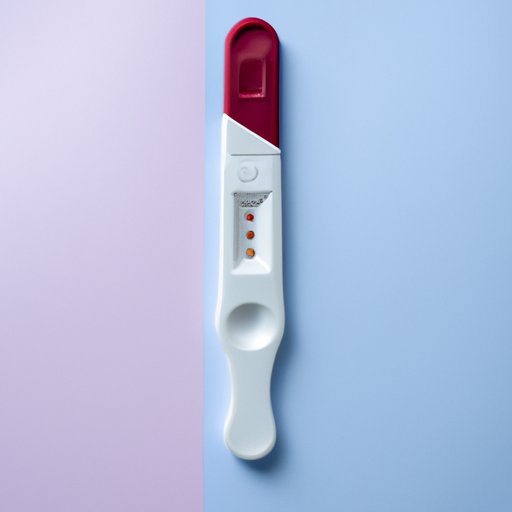
Introduction
There are few moments in life that are as exciting and life-changing as finding out you are pregnant. But knowing when to take a pregnancy test can be a stressful and confusing experience. There are several factors to consider when deciding whether to take a pregnancy test, including the regularity of your menstrual cycle, timing of potential unprotected sex, and which types of pregnancy tests are most reliable. This guide will provide you with expert advice and personal anecdotes to help you decide when to take a pregnancy test and feel empowered in the process.
Factors that Influence When to Take a Pregnancy Test
The timing of when to take a pregnancy test can be influenced by many factors. One of the most important of these is the regularity of your menstrual cycle. Typically, a pregnancy test can be taken as early as the first day of a missed period. However, if your cycle is irregular, it can be difficult to know when a missed period may occur. In these cases, it’s recommended to wait at least two weeks after you believe unprotected sex may have occurred before taking a test.
The timing of unprotected sex can also impact when to take a pregnancy test. Sperm can live inside the body for up to five days, so if you have had unprotected sex in the five days leading up to ovulation, there is a chance of becoming pregnant. In this case, it may be best to wait until the first day of a missed period before taking a pregnancy test.
Other factors to consider when deciding when to take a pregnancy test include age, overall health, and use of fertility treatments. If you’re over the age of 35, it may be best to consult with your healthcare provider about when to take a pregnancy test. Women with certain medical conditions or who are taking certain medications should also consult with a healthcare provider before taking a test. If you have undergone fertility treatments, your doctor may also recommend a specific time frame for taking a pregnancy test.
Types of Pregnancy Tests Available
There are several types of pregnancy tests available, including urine tests and blood tests. Urine tests are typically the most common type of pregnancy test and can be purchased over-the-counter or administered by a healthcare provider. Blood tests are usually only administered by healthcare providers and are able to detect pregnancy much earlier than urine tests.
The most sensitive and reliable pregnancy tests are those that detect human chorionic gonadotropin (hCG) in the urine. These tests can often detect pregnancy as early as one week after ovulation or a missed period. It’s important to read the packaging carefully to ensure you purchase the most sensitive test possible.
How to Take a Pregnancy Test
Taking a pregnancy test is a relatively simple process. Most urine tests involve holding a test strip or wand under the urine stream for a few seconds. Some tests may require you to collect urine in a cup and then dip the test strip into the urine. Blood tests are usually administered at a healthcare provider’s office and involve drawing a sample of blood.
When taking a pregnancy test, it’s important to carefully read the instructions on the packaging. Make sure you understand how long to hold the test under the urine stream, how long to wait before reading the results, and what a positive or negative result looks like. It’s also important to ensure you are using the test correctly and that the test has not expired. False positives or negatives can occur if the test is not used properly.
Expert Advice for Taking a Pregnancy Test After Fertility Treatments
For women who have undergone fertility treatments such as in vitro fertilization (IVF) or clomid, it can be difficult to know when to take a pregnancy test. In these cases, it’s best to consult with your healthcare provider. Typically, women who have undergone these treatments will be given a specific time frame to take a pregnancy test.
Case Studies and Personal Experiences
Many women have stories of taking pregnancy tests too soon or too late. One woman recounts taking a test the day after a missed period and getting a negative result, only to find out a week later that she was indeed pregnant. Another woman shares a story of waiting nearly two weeks after her missed period to take a test, only to find out she was not pregnant. These personal anecdotes serve as a reminder that timing is important when it comes to taking a pregnancy test.
How to Cope with Anxiety and Uncertainty
Waiting to take a pregnancy test can be a stressful and anxiety-inducing experience. If you’re struggling with anxiety or uncertainty during the waiting period, there are several tips and techniques you can use to help cope. Relaxation techniques, such as deep breathing or yoga, can help calm your nerves. Confiding in a trusted friend or partner can also provide you with emotional support. Remember that you are not alone in this experience and that it’s okay to feel nervous or uncertain.
Conclusion
Knowing when to take a pregnancy test can be a confusing and overwhelming experience. By considering factors such as the regularity of your menstrual cycle, the timing of unprotected sex, and the types of pregnancy tests available, you can make an informed decision about when to take a test. Remember to carefully read the instructions on the packaging and consult with your healthcare provider if you have any concerns or questions. With the right information and support, you can feel empowered in making decisions about your reproductive health.




